In the modern logistics and warehousing industry, forklifts are indispensable equipment, undertaking the heavy responsibility of cargo handling, loading and unloading, and storage. However, as global attention to environmental protection and sustainable development deepens, traditional fuel powered forklifts are gradually being replaced by electric forklifts. This green transformation from fuel to electric is not only a technological innovation, but also an important step for enterprises and society to move towards a low-carbon future. This article will explore the background, advantages, and profound impact of the rise of electric forklifts on the forklift industry.
1、 Limitations of fuel powered forklifts
For a long time, fuel powered forklifts have dominated heavy industry and outdoor operations due to their powerful power and long operating time. However, fuel powered forklifts have significant drawbacks. Firstly, the combustion of fuel produces a large amount of carbon dioxide, nitrogen oxides, and particulate matter, which pollutes the environment, especially when working indoors. Exhaust emissions can also harm the health of operators. Secondly, fluctuations in fuel prices and high maintenance costs have increased the operational burden on enterprises. In addition, the noise pollution of fuel forklifts cannot be ignored, especially in warehouses or factories that require a quiet environment.

2、 The Green Advantages of Electric Forklifts
Electric forklifts are powered by batteries and have zero exhaust emissions, making them an ideal choice for achieving green logistics. The following are the core advantages of electric forklifts in terms of environmental protection, efficiency, and cost:
1. Environmentally friendly
Electric forklifts do not produce exhaust gas during operation, significantly reducing their carbon footprint. According to statistics, a fuel powered forklift may emit several tons of carbon dioxide annually, while an electric forklift can reduce emissions to zero by using clean energy. This not only helps companies comply with environmental regulations, but also enhances their social responsibility image.
2. Low operating costs
Although the initial purchase cost of electric forklifts may be higher than that of fuel forklifts, their long-term operating costs are lower. Electricity prices are usually more stable and cheaper than fuel, and electric forklifts require less maintenance - no engine oil, filters, or exhaust systems need to be replaced, and the failure rate is also lower. Research shows that the total cost of ownership of electric forklifts can save 20% -30% compared to fuel forklifts within 5 years.
3. Quiet and efficient
Electric forklifts operate with almost no noise, making them ideal for indoor work or noise sensitive environments such as food warehouses or hospital logistics. In addition, modern electric forklifts are equipped with advanced battery management systems and motor technology, with power and performance comparable to or even surpassing fuel forklifts, meeting various needs from light to heavy handling.
4. Promotion of Technological Progress
The breakthrough of lithium battery technology is the key to the popularization of electric forklifts. Compared with traditional lead-acid batteries, lithium batteries charge faster (can be fully charged in 1-2 hours), have a longer lifespan (up to 5-10 years), and support opportunistic charging (i.e. short-term charging to extend operation). These innovations eliminate concerns about the insufficient range of electric forklifts in the past
3、 The challenge of green transformation in the forklift industry
Despite the obvious advantages of electric forklifts, there are still some challenges in the transformation process. Firstly, the initial investment cost is relatively high, especially for high-end models equipped with lithium batteries, which may deter small and medium-sized enterprises. Secondly, the construction of charging infrastructure requires time and funding, especially in remote areas or old warehouses. In addition, if battery recycling and disposal are not standardized, it may lead to new environmental problems.
However, these challenges are gradually being overcome. The subsidies and tax incentives provided by the government and institutions have reduced purchasing costs; The expansion of charging station networks and the application of intelligent charging technology have solved infrastructure problems; The advancement of battery recycling technology also ensures the recycling of resources.
4、 Future prospects for green transformation
The popularization of electric forklifts marks a new stage of green and intelligent development in the forklift industry. In the future, with the further integration of renewable energy, electric forklifts will be more environmentally friendly. At the same time, the development of automation and IoT technology will drive the application of intelligent electric forklifts, such as forklifts equipped with sensors and AI that can achieve autonomous navigation and optimized paths, further improving efficiency.
For enterprises, adopting electric forklifts is not only a response to environmental policies, but also a strategic choice to enhance competitiveness. Consumers are increasingly favoring green supply chains, and businesses can win market trust and brand loyalty by showcasing sustainable practices.
5、 Conclusion
The green transformation of the forklift industry from fuel to electric is both a challenge and an opportunity. Electric forklifts, with their zero emissions, low cost, and high efficiency, are reshaping the landscape of logistics and warehousing. Whether it is due to environmental responsibility, cost considerations, or future development needs, enterprises should actively embrace this change. The green transformation of the forklift industry is not only a technological upgrade, but also a solid step towards a sustainable future.


